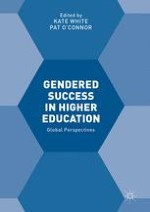2017 | OriginalPaper | Buchkapitel
12. Who Promotes a Gender Agenda? An Indian Case Study
verfasst von : Tanuja Agarwala
Erschienen in: Gendered Success in Higher Education
Verlag: Palgrave Macmillan UK
Aktivieren Sie unsere intelligente Suche, um passende Fachinhalte oder Patente zu finden.
Wählen Sie Textabschnitte aus um mit Künstlicher Intelligenz passenden Patente zu finden. powered by
Markieren Sie Textabschnitte, um KI-gestützt weitere passende Inhalte zu finden. powered by
